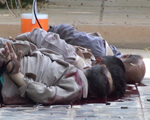 UPI: The growing number of dead men found in the streets and canals of Baghdad, mostly shot in the head, some bearing the marks of torture, is stirring fears Shiite death squads are back in business.
UPI: The growing number of dead men found in the streets and canals of Baghdad, mostly shot in the head, some bearing the marks of torture, is stirring fears Shiite death squads are back in business.
United Press International

BAGHDAD (UPI) — The growing number of dead men found in the streets and canals of Baghdad, mostly shot in the head, some bearing the marks of torture, is stirring fears Shiite death squads who slaughtered hundreds, possibly thousands, of Sunnis during the dark days of Iraq’s sectarian bloodbath are back in business.
A few weeks ago, children playing in the eastern sector of the Iraqi capital discovered the corpses of 10 young men — all shot in the head, blindfolded and handcuffed — piled up in a room in an abandoned apartment block.
Police reported they had no idea who was responsible for the slayings. Witnesses are rare.
But amid a swelling al-Qaida insurgency in which the Sunni jihadists have systematically killed large numbers of Shiites, Iraq’s majority sect, there are growing suspicions that the execution-style murders mark the return of Shiite assassination squads who terrorized the sprawling city of 7 million at the height of the sectarian war in 2004-07.
One of the most bloodthirsty squads was led by a Shiite known as Abu Deraa, which means “Father of the Shield” in Arabic.
At one time he was a commander in the Shiite militia known as the Mehdi Army, which was headed by a fiery cleric named Moqtada al-Sadr, who twice launched insurgencies against U.S. forces.
Sadr, who has close links with Tehran, has renounced violent action but remains a rival of Prime Minister Nouri al-Maliki, a Shiite first elected in 2005.
Maliki’s overwhelmingly Shiite security forces, which included many ex-militiamen, failed repeatedly to kill or capture Abu Deraa and other Shiite death squad chieftains whose victims were invariably Sunni.
Indeed, they were widely believed to have turned a blind eye to his barbarous depredations. Most of his victims were tortured before being killed. Bodies were found left in the streets, on garbage dumps and in the city’s canals, pierced by nails and bolts, or bored by hand-held power drills that became his gruesome trademark.
In those days, the bodies of Abu Deraa’s victims were usually dumped on a stretch of waste ground known as al-Saddeh on the outskirts of Sadr City, a vast Shiite suburb of Baghdad that was a Medi Army stronghold.
It became known with macabre humor as “”Happiness Hotel.”
Abu Deraa disappeared in 2007. The Asharq al-Awasat newspaper reported then he’d fled to Iran because the Americans were getting too close.
He was reported to have returned to Baghdad in summer 2010.
U.S. officials at the time linked him to one of Iran’s “special groups” fighting the Americans known as Asaib Ahl al-Haq, or League of the Righteous, which supports Maliki and carried out some of the major attacks on foreigners during the Iraq war.
It’s not clear whether Abu Deraa — whose real name is either Ismail al-Lami, twice married with a dozen children, or Ismail Hafidh, depending on who one talks to — engaged in any assassinations at that time.
But a Feb. 9 Washington Post report quoted an AAH commander using the nom de guerre Abu Sajad as admitting the group is once more killing Sunnis to avenge al-Qaida suicide bombings.
AAH, reputed to have an estimated 2,000-3,000 Iranian-trained fighters, is also engaged in the Syrian war alongside Lebanon’s Hezbollah against the Sunni-led rebels.
In one week in December, Iraqi authorities found the bodies of at least 41 men who’d been shot in the head or decapitated, apparently by Shiite death squads and stripped of all traces of their identities.
The fear is these killings will fuel another full-blown civil war as sectarian passions escalate during the run-up to potentially divisive parliamentary elections in April.
The execution-style killings are no longer confined to Baghdad, where Shiites have driven out tens of thousands of Sunnis in recent years in a wave of ethnic cleansing.
Such multiple killings — one involved 18 victims — have been reported by authorities in Tikrit, 90 miles north of Baghdad, and the northern city of Mosul.
There are deep suspicions the Shiite death squads operate under the umbrella of Maliki’s security forces. The government denies that.
Michael Knights, an Iraq expert with the Washington Institute for Near East Policy, noted recently that “many elements of AAH” and other Iranian special groups “will probably be drawn into the security forces” in Iraq to fight the Sunnis.


